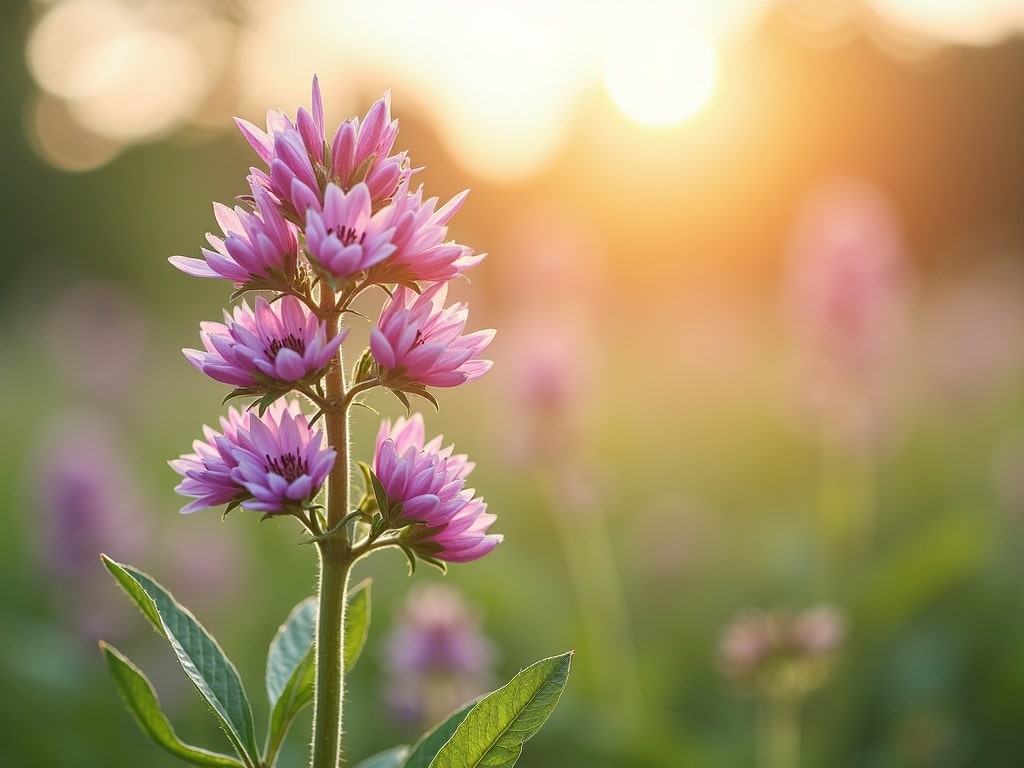Here's your SEO-optimized article on the benefits of red clover for menopause:
Unlocking Relief: Red Clover Benefits for Menopause
Imagine a gentle meadow bathed in sunlight, dotted with vibrant crimson blossoms. These aren't just pretty flowers; they hold a potential key to easing the often turbulent journey through menopause. For countless women, this transition marks a significant shift, bringing with it a cascade of symptoms that can disrupt daily life. Hot flashes, night sweats, mood swings, and sleep disturbances become unwelcome companions. But what if nature offered a helping hand? That's where red clover steps into the spotlight, offering a natural approach to managing menopause symptoms.
Understanding Menopause and Its Challenges
Menopause isn't a disease; it's a natural biological process that signals the end of a woman's reproductive years. It's officially defined as occurring 12 months after a woman's last menstrual period. This transition typically happens between the ages of 45 and 55, with the average age being 51.
The primary driver behind menopause is the decline in estrogen production by the ovaries. Estrogen plays a crucial role in regulating various bodily functions, including:
- The menstrual cycle
- Bone density
- Cardiovascular health
- Mood regulation
- Skin elasticity
As estrogen levels fluctuate and eventually decline, women may experience a range of symptoms, often referred to as menopausal symptoms. These can vary significantly in intensity and duration from woman to woman. Common symptoms include:
- Hot flashes: Sudden sensations of intense heat, often accompanied by sweating and a flushed face.
- Night sweats: Hot flashes that occur during sleep, leading to disrupted sleep patterns.
- Mood swings: Irritability, anxiety, and even mild depression.
- Sleep disturbances: Difficulty falling asleep or staying asleep.
- Vaginal dryness: Reduced lubrication, leading to discomfort during intercourse.
- Bone loss: Increased risk of osteoporosis due to decreased estrogen's protective effect on bone density.
Hormone replacement therapy (HRT) has long been a common treatment for menopause symptoms, but it's not without its potential risks. Many women are seeking natural alternatives to manage their symptoms, leading them to explore options like red clover.
Red Clover: A Natural Ally for Menopausal Women?
Red clover (Trifolium pratense) is a legume that has been used for centuries in traditional medicine. It's a rich source of isoflavones, which are plant-based compounds that can mimic the effects of estrogen in the body. Because of this estrogen-like activity, red clover is often considered a phytoestrogen.
How Red Clover May Help
The potential benefits of red clover for menopause stem from its isoflavone content. These compounds can weakly bind to estrogen receptors in the body, potentially helping to alleviate some of the symptoms associated with estrogen decline. Here's a closer look at the potential benefits:
- Hot Flash Relief: Some studies suggest that red clover isoflavones may reduce the frequency and severity of hot flashes. While the evidence is mixed, some women report significant relief.
- Bone Health Support: Estrogen plays a vital role in maintaining bone density. Red clover isoflavones may help slow bone loss associated with menopause, potentially reducing the risk of osteoporosis. More research is needed in this area, but initial findings are promising.
- Improved Mood: Fluctuating hormone levels can contribute to mood swings and irritability during menopause. Red clover may help stabilize mood by providing a mild estrogenic effect.
- Better Sleep: By reducing night sweats and promoting a sense of calm, red clover may improve sleep quality in menopausal women.
- Cardiovascular Health: Some research suggests that red clover may have a positive impact on cardiovascular health by improving blood vessel function and reducing cholesterol levels. However, more studies are needed to confirm these benefits.
The Science Behind Red Clover and Menopause
Numerous studies have investigated the effects of red clover on menopausal symptoms. Some studies have shown positive results, while others have been inconclusive.
A 2016 meta-analysis published in *Maturitasreviewed several randomized controlled trials and concluded that red clover isoflavone supplementation may reduce the number of daily hot flashes experienced by menopausal women. However, the researchers noted that the quality of the studies varied, and further research is needed to confirm these findings.

A study published in the *American Journal of Clinical Nutritionfound that red clover isoflavones may improve bone mineral density in postmenopausal women. The study participants who took red clover supplements experienced a significant increase in bone density compared to those who took a placebo.
It's important to note that the effectiveness of red clover can vary depending on factors such as dosage, individual differences in metabolism, and the specific red clover extract used.
How to Use Red Clover
Red clover is available in various forms, including:
- Capsules or Tablets: This is a convenient way to take a standardized dose of red clover isoflavones.
- Tea: Red clover tea is made by steeping the dried flowers in hot water. It's a gentle way to enjoy the potential benefits of red clover.
- Tinctures: Red clover tinctures are liquid extracts that can be added to water or juice.
- Extracts: Red clover extracts can be found in some skincare products.
Dosage and Considerations
The optimal dosage of red clover for menopause symptoms can vary. Most studies have used dosages ranging from 40 to 80 mg of isoflavones per day. It's best to start with a lower dose and gradually increase it as needed, while monitoring for any side effects.
Red clover is generally considered safe for most women, but it's important to be aware of potential side effects and interactions.
- Side Effects: Some women may experience mild side effects such as nausea, headache, or rash.
- Drug Interactions: Red clover may interact with certain medications, such as blood thinners and hormone therapy. It's important to talk to your doctor before taking red clover if you are taking any medications.
- Hormone-Sensitive Conditions: Women with hormone-sensitive conditions, such as breast cancer, uterine cancer, or endometriosis, should exercise caution when using red clover, as it may have estrogenic effects. Consult with your doctor before use.
- Pregnancy and Breastfeeding: Red clover is not recommended for pregnant or breastfeeding women.
Other Natural Strategies for Managing Menopause
While red clover may offer some relief from menopause symptoms, it's often most effective when combined with other lifestyle strategies. These include:
- Diet: Eating a balanced diet rich in fruits, vegetables, whole grains, and lean protein can help support overall health during menopause. Limiting caffeine and alcohol intake may also help reduce hot flashes.
- Exercise: Regular physical activity can improve mood, sleep, and bone health. Aim for at least 30 minutes of moderate-intensity exercise most days of the week. Consider activities like walking, swimming, or yoga.
- Stress Management: Stress can exacerbate menopause symptoms. Practice relaxation techniques such as deep breathing, meditation, or yoga to manage stress levels.
- Herbal Remedies: Other herbs that may help with menopause symptoms include black cohosh, evening primrose oil, and St. John's wort. Talk to your doctor or a qualified herbalist before using these remedies, as they may interact with medications or have side effects.
- Acupuncture: Some studies suggest that acupuncture may help reduce hot flashes and improve sleep quality in menopausal women.
Making Informed Choices
Navigating menopause can be a challenging experience, but you don't have to go through it alone. Red clover offers a natural option for managing symptoms, but it's important to approach it with realistic expectations and to consult with your doctor. By combining red clover with other healthy lifestyle strategies, you can empower yourself to thrive during this natural transition.
Remember, every woman's experience with menopause is unique. What works for one person may not work for another. Be patient with yourself, listen to your body, and find the strategies that help you feel your best.

